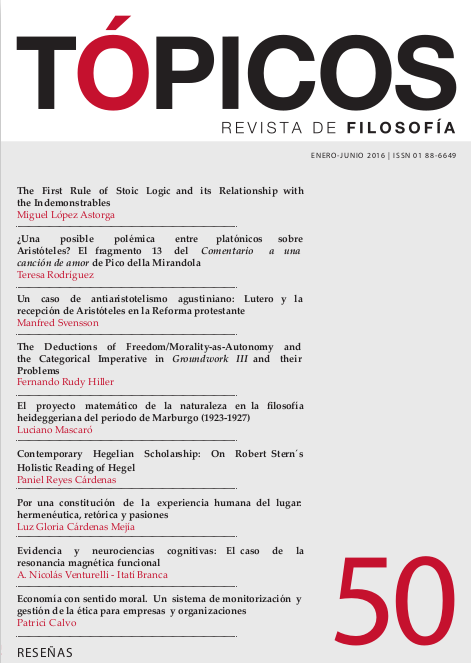Artículos
The Deductions of Freedom/Morality-as-Autonomy and the Categorical Imperative in Groundwork III and Their Problems
Publiée 2015-12-20
Mots-clés
- Groundwork,
- Kant,
- deduction,
- moral law,
- fact of reason
Comment citer
Hiller, F. R. (2015). The Deductions of Freedom/Morality-as-Autonomy and the Categorical Imperative in Groundwork III and Their Problems. Tópicos, Revista De Filosofía, 50, 61-94. https://doi.org/10.21555/top.v0i50.743
Résumé
The first objective of this paper is to present an interpretation of Groundwork III which aims to establish two main points: first, that Kant offers there a theoretically-grounded deduction (in Kantian sense) of freedom/morality-as-autonomy; second, that Kant also offers a separate deduction of the categorical imperative. Thus, contrary to what several commentators have claimed, Groundwork III contains a theoretically-grounded double deduction. The second objective of the paper is to examine and criticize in detail one crucial step in these deductions, namely, Kant’s inference from the speculative spontaneity of reason to the noumenal existence of the subject as a free will. I show that Kant himself came to reject this inference in the B edition of the Critique of Pure Reason, and argue that this explains Kant’s rejection, in the Critique of Practical Reason, of the deduction of the moral law he previously offered. Thus, contrary to the “reconciliationist” reading, there is indeed a great reversal in the latter work.Références
- Allison, H. (1990) Kant’s Theory of Freedom, Cambridge: Cambridge University Press.
- Ameriks, K. (1982) Kant’s Theory of Mind, Oxford: Oxford University Press.
- ____ (2003, originally published 1981). Kant’s Deduction of Freedom and Morality. Interpreting Kant’s Critiques. (161-192). Oxford: Oxford University Press.
- Esteves, J. (2012). The Non-Circular Deduction of the Categorical Imperative in Groundwork III. Kant in Brazil. D. Perez & F. Rauscher (Eds.) (155-172). Rochester: University of Rochester Press.
- Henrich, D. (1989). Kant’s Notion of a Deduction and the Methodological Background of the First Critique. In Kant’s Transcendental Deductions. E. Forster (Ed.) (29-46). Stanford, CA: Stanford University Press.
- ____ (1994, originally published in 1960). The Concept of Moral Insight and Kant’s Doctrine of the Fact of Reason. The Unity of Reason. (55-88). Cambridge, MA: Harvard University Press.
- ____ (1998, originally published in 1975). The Deduction of the Moral Law: The Reasons for the Obscurity of the Final Section of Kant’s Groundwork. In Kant’s Groundwork of the Metaphysics of Morals: Critical Essays. P. Guyer (Ed.) (303-342). New York: Rowman & Li le eld.
- Kant, I. (1997). Critique of Practical Reason. M. Gregor (Trans.) Cambridge: Cambridge University Press.
- ____ (2007). Critique of Pure Reason. P. Guyer & A. Wood (Trans.) Cambridge: Cambridge University Press.
- ____ (2012). Groundwork of the Metaphysics of Morals. M. Gregor & rev. J. Timmermann (Trans.) Cambridge: Cambridge University Press.
- Korsgaard, C. (1996). Morality as Freedom. Creating the Kingdom of Ends. (159-187). Cambridge: Cambridge University Press.
- McCarthy, M. (1979). Kant’s Application of the Analytic/Synthetic Distinction to Imperatives. Dialogue 18, 373-391.
- ____ (1985). The Objection of Circularity in Groundwork III. Kant-Studien 76, 28-42.
- Paton, H. (1965). The Categorical Imperative, London: Harper.
- Rauscher, F. (2009). Freedom and Reason in Groundwork III. In Kant’s ‘Groundwork of the Metaphysics of Morals’: A Critical Guide. J. Timmermann (Ed.) (203-223). Cambridge: Cambridge University Press.
- Tenenbaum, S. (2012). The idea of Freedom and Moral Cognition in Groundwork III. Philosophy and Phenomenological Research, 84, 555-589.
- Timmermann, J. (2010). Reversal or Retreat? Kant’s Deductions of Freedom and Morality. In Kant’s ‘Critique of Practical Reason’: A Critical Guide. A. Reath and J. Timmermann (Eds.) (73-89). Cambridge: Cambridge University Press.






